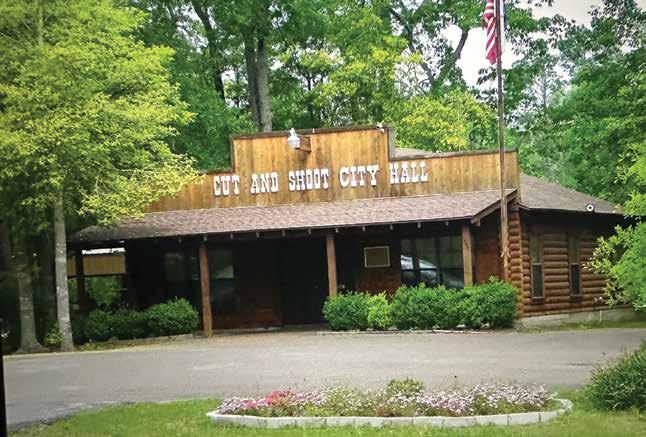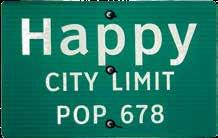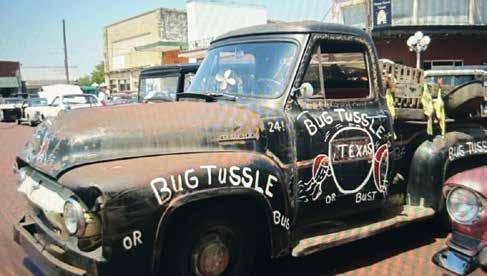
5 minute read
Addressing Towns with Unusual Names
by Linda A. Thornton
Giggles, sincere interest, busybody curiosity—just some of the reactions a unique group of Texas townspeople experience every time they are asked where they live.
This unofficial club never seems to tire of explaining the unusual, unique, and downright bizarre origins of their town’s names, ranging from humorous incidents to prominent residents to historical events. With true Texas pride, they will politely correct your pronunciation, assist you with spelling, and proudly affix their return address label to an envelope.
Here are some of those strange-to-us, lovable-to-others places to live. Locations are included if you decide to see them for yourself:
Buda
Pronounced “Byoo-duh,” this city in Hays County is part of the Austin-Round Rock-San Marcos metropolitan area and is one of Austin’s fastest growing suburbs. After the Texas Mexico War, many widows were left behind. It is believed that Buda is a mispronunciation of the word “viuda,” the Spanish word for widows. Little did two widows—who worked as cooks at the Carrington Hotel in the 1880s—realize they would be honored as the town’s namesakes.
Cut And Shoot
Located in Montgomery County, this town of just over 1,000 residents sits 40 miles north of Houston. Its name dates back to a heated disagreement among churchgoers about steeple design, preacher choice, and land ownership. As tempers rose, a young boy suddenly shouted, “I’m going to cut around the corner and shoot through the bushes in a minute!” His outburst startled the group, and the words became immortalized as the town’s new name.
Dime Box
This unincorporated community in Lee County once used a large wooden box for mail. Locals would leave a dime in the bottom to pay the mail carrier. When the original name, Brown’s Mill, caused confusion with Brownsville, the U.S. Postal Service requested a change. It made perfect “cents” to honor the dime box.
Frognot
Located about 20 miles east of McKinney, this community was plagued with frogs every time it rained. As the story goes, boys would catch the frogs and bring them to school to scare girls. After weeks of shrieking and chaos, the exasperated schoolmaster announced that frogs were no longer allowed at school. Frogs were not permitted, he declared—leading to the name Frognot.
Ding Dong
This tiny community of fewer than 50 residents lies along the Lampasas River in the Killeen-Temple metropolitan area. In the 1930s, two relatives with the last name Bell ran a country store here. Their store sign, featuring two bells and the words “Ding Dong,” had a certain ring to it—and the name stuck.
Happy

Known as “The Town Without a Frown,” this cheerful little spot in the Texas Panhandle might owe its name to its residents—or to Happy Draw, a stream named by cowboys in the 19th century. After long, dusty rides, they were understandably happy to find water.
Iraan
This small town with a population of a little over 1,000 is located in Pecos County. In the early 1900s, Ira and Ann Yates built a ranch upon which the town was built. Combining their first names seemed a fitting tribute to the ranchers.
Nacogdoches
This historic East Texas town is the county seat of Nacogdoches County and is known as the “Oldest Town in Texas.” It played a significant role during the Texas Revolution and was once a hub for trade. The Battle of Nacogdoches marked a key moment in the Fredonian Rebellion, when Texans attempted to secede from Mexico and establish the nearby Republic of Fredonia.
Bug Tussle
The unincorporated community in southeastern Fannin County can thank an 1890s ice cream social gone awry for its name. When a swarm of bugs crashed their party, the churchgoers bravely fought off the invasion and the name was changed to commemorate the battle.

NAMELESS
Straddling the border of Travis and Williamson counties, this town is part of the Austin-Round Rock metropolitan area. Legend has it that when residents applied for a post office, every name they suggested had already been taken. Frustrated, they sent a note saying, “Let the post office be nameless and be damned!” The postmaster followed their instructions.
TARZAN
This community in Martin County might have ended up with a very different name if not for Tant and Viola Lindsay, who moved there in 1926. The couple opened a general store and hoped to establish a post office. Viola and Tant, a fan of Edgar Rice Burroughs’ Tarzan novels, had submitted several possible names, but all were rejected as duplicate town names. On a whim, Viola suggested adding “Tarzan” to the list. To their surprise, it was approved—and the name stuck.
UNCERTAIN
Located in Harrison County, this tiny town got its name by accident. When the township application was filled out, the name hadn’t yet been decided, so “Uncertain” was written in the blank. And just like that, the name became official.









